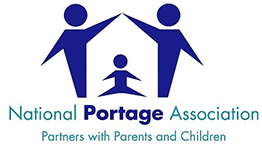Summary:
The National Portage Association (NPA) is a Registered Centre with Open Awards responsible for the administration and delivery of the Open Awards Level 3 qualification 'The Portage Model - A Small Steps Approach to Learning for Children with Special Educational Needs'. A key element of the qualification is maintaining standards and ensuring quality.
Who is the course suitable for?
The course is suitable for anyone who has successfully completed the Portage Workshop including Parents, Carers and Early Years Practitioners working in early years provision, and is completed under the supervision of a Mentor. The Mentor might be the Accredited Trainer who delivered the NPA Portage Workshop attended before applying for this Level 3 qualification, or it could be a team leader or supervisor if there is not an Accredited Trainer in the area.
Students are required to be a member of the NPA to enable them to access course content and the templates required to complete this qualification.
Additional Information:
What does the course cover?
The course requires candidates to produce a portfolio of work which builds upon the content of the Portage Workshop training course. Candidates must complete and submit assignments, divided into 7 modules.
The suggested time for completing assignments is approximately 15 hours. Students should aim to complete their portfolio for assessment in 30 weeks (see guidance/Student Handbook for full details).
The learning outcomes of the course are:
1. To understand the Portage Model and its relevance to early years settings
- Describe the Portage Model Principles and how they can be used in different settings
- Analyse the importance of working in partnership with families
- Evaluate the importance of Portage in relation to national Special Educational Needs reforms and priorities
2. To be able to use clear language when planning for children with special educational needs
- Reflect on the need for clear language when planning for supporting children with special educational needs
- Analyse the importance and benefits of using clear language
- Demonstrate using clear language when writing teaching targets for children with Special Educational Needs
3. To be able to effectively plan for success
- Describe how to complete an holistic assessment for a child in your setting, outlining what tools you use
- Analyse the range of information needed to set appropriate long term goals
- Evaluate a case study of a child
4. To be able to apply a ‘small steps’ approach to learning
- Demonstrate how to break down tasks to make learning accessible
- Plan a sequence of small steps towards a given long term goal for a child with special educational needs
5. Be able to plan, record and share information
- Critically compare different models for planning, recording and sharing information, including when each should be used
- Use the appropriate model for recording an open-ended activity to plan a play activity for a child with special educational needs Based on Portage Guidelines
- Produce two outcome focused activity charts to plan targeted activities for a child with Special Educational Needs based on Portage Guidelines
6. To understand how to support the development of play
- Evaluate examples of how children with a range of SEND may need specific support to develop their play
7. To be able to implement positive approaches to children’s behaviour
- Analyse ‘age appropriateness’ of children's emotional self regulation by identifying the messages being communicated through behaviour
- Demonstrate the use of a behaviour plan to promote positive behaviour
- Reflections of own performance and use of Portage in Practice
Why should I complete Level 3?
Completion of this Award allows the Student:
- To gain experience of using Portage principles with children who have additional needs
- Work with and learn from parents and other professionals
- To gain access to support from highly skilled Portage professionals working in the field of early years/SEND
- Improve their everyday practice to the benefit of all children, not just those with additional needs
- Develop an understanding of how to achieve real, meaningful inclusion
- Increase their confidence in working with disabled children




